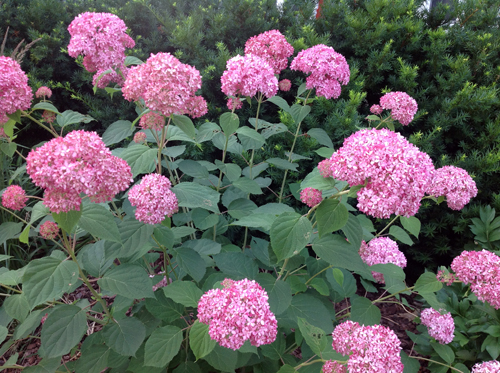Gardening in Kansas City
Plant the Tried and True and Some Things New
Return to Miscellaneous Agent Articles

New. New and improved. Extra strength. Concentrated. Stronger. These are just a few of the words used to describe household products in an effort to tempt us into buying them. The world of advertising has long used emotion as a ploy in swaying our purchasing decisions.
The horticulture world was slow to catch on, but now I must admit it fully embraces these tactics in order to collect our hard earned dollars on plant purchases. Gardening has always used teasing statements since the days of mail order catalogs. Each plant selection was described in glowing terms. Seriously, how many ways can you describe a beet or radish to make it sound better than the next? But now companies not only use fancy words but have glossy photos and seductive names to capture your purchasing dollars.
All we really want to know is if the latest and greatest is really any better than the old standbys. That is the question. Back in the good old days companies would test new introductions for years to ensure they had a winner. Now, in this dog-eat-dog world, being first on the market is usually more important than having the best on the market. It is just human nature to want the new and improved.
Stick with what works but also be adventurous
When it comes to plant materials, whether it’s vegetable seeds or shrubs, my take is to follow this advice; plant the tried and true and add some of the new. So what do I mean?
Let’s first look at vegetables. Back in the days of abundant money, universities around the country, including Kansas State would conduct vegetable variety trails. As a result, we would know tomato A was better than tomato B. But now most of the funding for this type of research has been cut. This type of research is rarely done anymore by non-biased sources and is usually left to the plant breeders. And of course their new introduction is always the best. See the problem?
My recommendation is plant the backbone of the garden with the tried and true varieties that we know will be successful. Then add a few of the new and see for yourself if they really do live up to the hype. Here is a good example using the plain old beet. One of the best beet varieties for the garden is Detroit Dark Red. This plant was introduced in 1892. I am sure countless other varieties have come and gone. Planting this hundred plus year old variety is still highly recommended. But for fun, plant a few of the newer varieties that just sound too good to pass up.
Shrub introductions
Probably the greatest industry change has come in the shrub world. New introductions flood the market all claiming to be better than what is already at the garden centers. Plant companies have also learned that alluring names get attention. These names usually involve food or a seductive image.
There is a difference between planting the hottest new shrub compared to an annual vegetable. A mistake is easy to fix. But plant an underperforming shrub and you have lost a decent amount of money, and are faced with the decision whether to remove and replant. Which means even more money and a greater loss — the loss of time. My advice with shrubs, trees and perennials is to wait a couple of years and see if the new introduction really does live up to the hype. Let someone else be the guinea pig. That way, you learn from them how the plant performs in our climate (versus the advertising hype), and, unfortunately sometimes, from their mistakes.
But sometimes the fun of gardening is experimenting or letting your friends know you have the most talked about plant on the market. In that case, if you’re willing to gamble maybe go ahead and plant. It really is up to you how you want to spend your gardening dollars. We work hard for our money and we don’t want to waste a penny. If this describes you then remember this helpful saying before being swayed by pretty marketing lingo; plant the tried and true and some of the new. By doing so you will find success, but may also experience the joy of discovering a new treasured plant for the garden.

Have questions? The Garden Hotline is staffed by trained EMG volunteers and Extension staff who will assist you with questions.
Phone: (913) 715-7050
Email: garden.help@jocogov.org